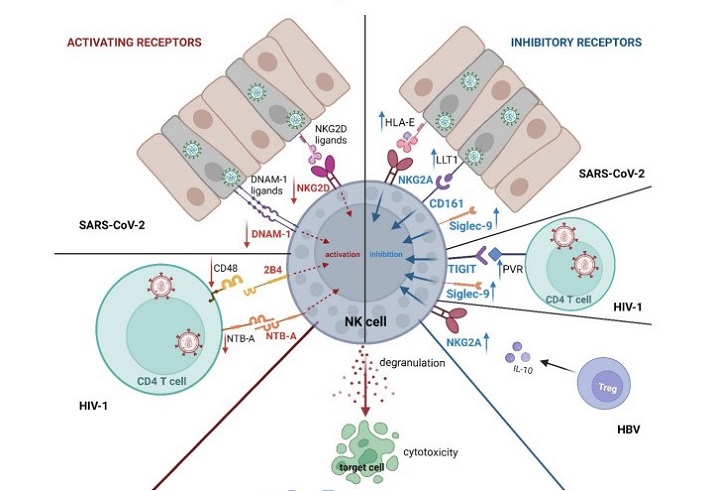Nikhil Prasad Fact checked by:Thailand Medical News Team May 21, 2024 10 months, 1 week, 4 days, 13 hours, 7 minutes ago
Medical News: Natural killer (NK) cells are a cornerstone of the innate immune system, renowned for their ability to eliminate infected, altered, or malignant cells without prior sensitization. This remarkable function hinges on the intricate balance of germ-line encoded NK cell receptors, which are finely tuned to distinguish between healthy self-cells and potential threats. The recent SARS-CoV-2 pandemic has renewed interest in understanding NK cell receptor modulation in viral infections, offering fresh perspectives on NK cell functionality and therapeutic opportunities. This review by researchers from Jagiellonian University Medical College-Poland that is covered in this
Medical News report, delves into the modulation of NK cell receptors during viral infections, emphasizing the pivotal roles of these receptors in immune responses and exploring the potential clinical applications of receptor modulation.
 Natural Killer Cell Receptor Modulation In Viral Infections: Current Insights. NK cell receptor-associated inhibition of NK cell function mediated by aberrant expression of the receptors or ligands
NK Cells and Their Functions
Natural Killer Cell Receptor Modulation In Viral Infections: Current Insights. NK cell receptor-associated inhibition of NK cell function mediated by aberrant expression of the receptors or ligands
NK Cells and Their Functions
NK cells, constituting approximately 5-20% of human peripheral blood lymphocytes, are characterized by their large granular appearance and their potent cytotoxic capabilities. These cells target altered or infected cells through mechanisms such as the release of perforin and granzymes from lysosomes, which induce apoptosis via Fas ligand (FasL), tumor necrosis factor (TNF-α), or TNF-related apoptosis-inducing ligand (TRAIL). Beyond their cytotoxic prowess, NK cells secrete a variety of pro-inflammatory cytokines and chemokines, including interferon-gamma (IFN-γ), TNF-α, interleukin-5 (IL-5), IL-13, macrophage inflammatory protein-1 (MIP-1), granulocyte-macrophage colony-stimulating factor (GM-CSF), and RANTES, which collectively enhance the immune response by activating macrophages, T cells, and B cells.
In humans, NK cells are classified into two primary subsets based on CD56 and CD16 surface markers. The CD56^dimCD16^bright subset, which accounts for about 90% of peripheral blood NK cells, exhibits high cytotoxic activity and facilitates antibody-dependent cellular cytotoxicity (ADCC) via the Fc gamma receptor III (FcγRIII). Conversely, the CD56^brightCD16^dim subset, representing about 10% of circulating NK cells, is less cytotoxic but is a significant producer of cytokines in response to cytokine stimulation rather than direct target cell interaction.
NK Cell Receptors and Their Roles
NK cell activation and functionality are governed by the interplay of activating and inhibitory receptors. Activating receptors recognize ligands on infected or malignant cells, while inhibitory receptors bind to self-HLA class I molecules or other specific ligands, often downregulated on altered cells. The dominance of inhibitory signals ensures tolerance to healthy cells,
whereas activation signals are required to trigger NK cell responses.
Key activating receptors include killer immunoglobulin-like receptors (KIRs), C-type lectin-like receptors (e.g., NKG2D, CD94/NKG2C), natural cytotoxicity receptors (e.g., NKp30, NKp44, NKp46), Ig superfamily receptors (e.g., DNAM-1), and signaling lymphocytic activation molecule (SLAM) family receptors (e.g., 2B4, CD48, NTB-A, CRACC). Inhibitory receptors, such as KIRs, CD94/NKG2A, TIGIT, Tim-3, PD-1, and CD161, act similarly to T cell immune checkpoints, regulating antiviral functions by recognizing ligands on infected cells.
NK Cell Receptors in Viral Infections
Viral infections often manipulate NK cell receptor expression to evade immune detection and destruction. This modulation can lead to NK cell activation, memory-like differentiation, or exhaustion. For instance, SARS-CoV-2 has been shown to downregulate activating receptors like NKG2D and DNAM-1 while upregulating inhibitory receptors such as NKG2A and CD161. This strategy hampers NK cell cytotoxicity and contributes to immune evasion.
SARS-CoV-2 and NK Cell Modulation
The SARS-CoV-2 pandemic has highlighted the significance of NK cell receptor modulation. Studies have revealed that COVID-19 patients exhibit impaired NK cell counts and function. Severe cases are characterized by high IL-6 levels, which suppress IFN-γ production and inhibit NK cell activity. Additionally, SARS-CoV-2 has been shown to downregulate activating receptors like DNAM-1 and NKG2D, despite their unaltered gene expression, through ligand overexpression and receptor-ligand complex internalization.
Comparative Insights from Other Viral Infections
Similar patterns of NK cell receptor modulation are observed in other viral infections. For instance, Herpes simplex virus (HSV) infections lead to downregulated expression of activating receptors such as CD16, NKp46, NKp80, NKG2D, and 2B4. Hepatitis B virus (HBV) and hepatitis C virus (HCV) infections also result in decreased expression of activating receptors, linked to elevated levels of transforming growth factor-beta 1 (TGF-β1).
In chronic HIV-1 infection, NK cells exhibit downregulated NKp46, NKp80, and NKG2D expression, along with increased inhibitory receptor expression such as NKG2A. HIV infection also induces the expression of viral protein U (Vpu), which downmodulates ligands for activating receptors, further diminishing NK cell functionality.
Clinical Significance and Future Perspectives
The modulation of NK cell receptors presents promising avenues for novel antiviral therapies. Strategies to upregulate activating receptor expression or inhibit inhibitory receptors could enhance NK cell-mediated cytotoxicity. For example, antibodies targeting NKG2A (e.g., monalizumab) have shown potential in restoring cytotoxic functions in cancer therapy and could be adapted for antiviral treatments.
Recent studies indicate that blocking receptors like NKG2A, KIR2DL1, Siglec-9, and CD161 can improve NK cell responses against SARS-CoV-2-infected cells. Similarly, disrupting Siglec-sialoglycan interactions has been suggested to stimulate NK cell-mediated anti-HIV responses. However, it is crucial to consider the distinct responses of NK cells and T lymphocytes to receptor modulation, as simultaneous blockade could yield different outcomes.
In summary, while significant progress has been made in understanding NK cell receptor biology and their roles in viral infections, further research is essential. A deeper understanding of NK cell receptor modulation could lead to more effective antiviral therapies, enhancing the immune system's ability to combat viral infections and improving patient outcomes.
The study findings were published in the peer reviewed journal: Clinical and Experimental Immunology.
https://academic.oup.com/cei/advance-article/doi/10.1093/cei/uxae045/7676625
For more about NK Cells, keep on logging to Thailand
Medical News.
Read Also:
https://www.thailandmedical.news/news/french-study-finds-that-natural-killer-cells-play-a-role-in-development-of-bipolar-disorders-findings-relevant-in-covid-19-era
https://www.thailandmedical.news/news/breaking-hong-kong-study-finds-that-covid-19-mrna-vaccines-activates-cd57-nk-cells-that-leads-to-acute-myocarditis
https://www.thailandmedical.news/news/increased-concentrations-of-cell-free-nkg2d-ligands-impair-the-functionality-of-nk-cells-in-severe-cases-of-covid-19
https://www.thailandmedical.news/news/deciphering-the-intricacies-of-covid-19-progression-unraveling-the-role-of-natural-killer-cell-mediated-cytotoxicity
https://www.thailandmedical.news/news/breaking-medical-news-italian-study-shows-that-covid-19-vaccines-causes-persistent-cd16-downmodulation-and-nk-cell-impairment
https://www.thailandmedical.news/news/breaking-supplement-news-university-of-minnesota-study-shows-that-vitamin-b3-can-enhance-nk-cell-function-to-treat-blood-cancers
https://www.thailandmedical.news/news/polish-study-reveals-that-sars-cov-2-impairs-human-natural-killer-nk-cells-through-the-activation-of-the-llt1-cd161-axis
https://www.thailandmedical.news/news/covid-19-news-study-finds-that-sars-cov-2-impairs-natural-killer-nk-cells-functions
https://www.thailandmedical.news/news/stanford-study-shows-that-the-sars-cov-2-coronavirus-is-able-to-evade-cytotoxic-responses-of-natural-killer-cells-and-cause-immune-dysfunction
https://www.thailandmedical.news/news/activation-of-type-1-dendritic-cells-cd11c-cd141-clec9a-and-exhausted-natural-killer-cells-are-key-drivers-of-post-covid-multisystem-inflammatory-synd
https://www.thailandmedical.news/news/covid-19-immunology-swedish-study-shows-natural-killer-cell-immunotypes-linked-to-covid-19-disease-severity
https://www.thailandmedical.news/news/researchers-discover-way-to-enhance-natural-killer-cells-for-potential-application-in-immunotherapy
